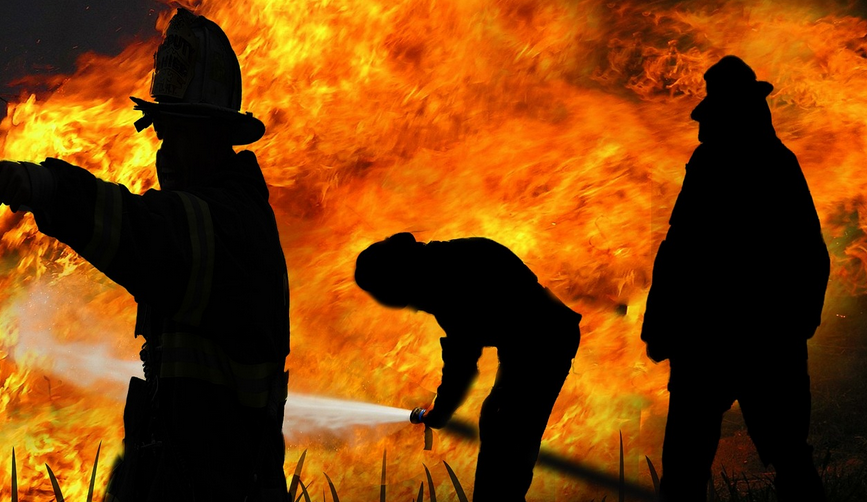Thank your lucky stars: Heroic dog Lucky saves family from a house fire BEFORE their smoke detectors went off

(Natural News) Dogs are popular pets because they are adorable, loyal animals, not to mention friendly and incredibly smart with some incredible abilities. In fact, some dogs have been found to be able to sniff out cancer in their owners. Now, according to a recent report, dogs can even sense a house fire before a smoke detector can alert their owners.
Lucky saves the day
According to a report from CBS 12, a dog in Pace, Florida, alerted his owners before a fire broke out in their home on July 11.
Lucky, the Troyers’ beloved dog, sensed something was wrong before the family’s smoke detectors went off that Saturday. Unknown to the Troyer family, a linseed-oil covered rag that they used to oil some rocking chairs caught fire.
Jennifer Troyer said that the oily rag combusted because their garage was so hot. As their garage went up in flames, Lucky alerted the family, allowing the Troyers to escape their home safely even before their smoke detectors went off.
On July 13, CBS 12 shared an adorable photo of the furry, caped hero on their Twitter account.
GOOD BOY! The dog, named Lucky, alerted the family of a fire before the smoke detectors. https://t.co/t923jtFfTQ
— WPEC CBS12 News (@CBS12) July 14, 2020
A dog’s amazing sense of smell
Researchers have been training dogs to detect different human diseases like cancer in various studies. More recently, health experts have been looking into the use of dogs’ sense of smell to detect the Wuhan coronavirus (COVID-19).
The genetics and physiology of dogs make them great at finding things using their incredible noses. Dogs have more genes that code for olfactory ability than humans – many more. These four-legged wonders also have more olfactory nerve cells compared to humans.
Throughout the years, humans have counted on dogs’ sense of smell for hunting, searching and detecting for many things, such as drugs and explosives. Now, researchers are hoping man’s best friend can help sniff out diseases before a patient’s condition worsens.
Humans only have five million scent receptors, but dogs have 220 million. As such, it should come as no surprise that dogs smell things that most humans will never notice.
A dog’s smell receptors are 10,000 times more accurate than a human’s and their nose is sensitive enough to find substances at concentrations of one part per trillion, like one drop of liquid in 20 Olympic-size swimming pools.
Smelling left and right
Dogs can also inhale about 300 times per minute in short breaths, allowing their olfactory cells to be constantly supplied with new odor particles. As a bonus, their noses can even differentiate between right and left.
These abilities allow dogs to detect “the slightest change in human scent caused by disease,” like the smallest “shifts in hormones or volatile organic compounds released by diseased cells.” Taking advantage of this fact, researchers have trained dogs to detect the markers of disease that can go unnoticed with medical tests.
Dogs and early disease diagnosis
Dogs can be trained to detect different types of cancer such as bladder cancer, breast cancer and skin cancer using samples from known cancer patients and cancer-free volunteers. Continued research on dogs and training them may be key to early cancer detection, which can help save thousands of lives using non-invasive, inexpensive and accurate techniques.
Dogs can also help detect other conditions like:
- Malaria – In a study, dogs were able to correctly pick out the scent of children infected with malaria parasites 70 percent of the time by simply smelling socks the young volunteers wore all night.
- Parkinson’s disease – Patients with Parkinson’s disease smell different at least years before they develop the disease. Dogs can be used to detect the early onset of the disease, ensuring that patients are treated before it’s too late to prevent their symptoms.
Dogs and coronavirus
Scientists are also looking into the use of dogs to help detect coronavirus.
For a pilot study at the University of Helsinki, researchers trained dogs to recognize the previously unknown odor signature of coronavirus. After several weeks, the first dogs trained accurately distinguished urine samples from COVID-19 patients from the urine samples of healthy individuals. The trained canines were almost as reliable as a standard PCR test.
Now, the research team is preparing a randomized, double-blind study where the dogs will sniff a larger number of patient samples to determine if the scent tests will be just as effective in clinical practice.
However, it remains to be seen which substances in human urine produce the telltale COVID-19 odor. As the virus attacks a patient’s lungs, blood vessels, kidneys and other organs, experts posit that the virus also changes a patients’ urine odor.
Scientists hope that this theory is true because respiratory diseases like COVID-19 change a person’s body odor, meaning dogs can detect it if this is the case.
One final hurdle for super sniffer dogs and disease prevention
Despite the many studies that prove how dogs can detect disease, it may take some time before they can be consistently used in laboratories in place of standard testing since scientists have yet to determine “what chemical compounds dogs detect to alert to the presence of the disease.” This final obstacle must first be addressed before dogs can be trained better and before scientists can create machines that will be used to more accurately detect cancer in its early stages.
Visit NaturalNewsPets.com for more articles about the amazing abilities of dogs and other clever pets.
Sources include:
UnderstandingAnimalResearch.org.uk


